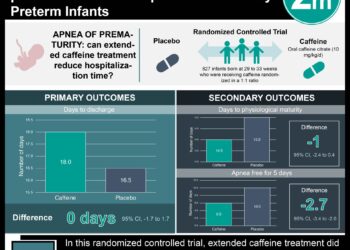The ORIP trial: n-3 polyunsaturated long chain fatty acid supplementation has no effect on preterm delivery rate
1. A multicenter randomized control trial concluded that n-3 polyunsaturated fatty acid supplementation in pregnancy did not change the risk of preterm delivery or the risk of post-term induction or cesarean section.
2. The safety profile of n-3 polyunsaturated fatty acid supplementation in pregnancy was similar to control.
Evidence Rating Level: 1 (Excellent)
Study Rundown: Preterm delivery, delivery before 37 weeks of gestation, is associated with increased childhood morbidity and mortality. N-3 long-chain polyunsaturated fatty acids are known to play a role in modulating proinflammatory prostaglandins such as PGE2 and PGF2a that are associated with cervical ripening and uterine contractility. In this multicenter, double-blind randomized control trial, researchers assessed whether supplementation of n-3 long chain fatty acids between 14 and 34 weeks of gestation would lead to a lower rate of preterm delivery and lower neonatal complications after delivery. Participants in this study were randomized to take supplements of n-3 long chain polyunsaturated fatty acids or a control supplement largely consisting of isocaloric vegetable oil. Overall, researchers noted no difference in preterm delivery rates between groups. There also was no noted difference in the rate of post-term induction of labor or the rate of post-term cesarean section.
Click to read the study in NEJM
Relevant Reading: Maternal Fatty Fish Intake Prior to and during Pregnancy and Risks of Adverse Birth Outcomes: Findings from a British Cohort
In-Depth [randomized clinical trial]: This trial was a double-blinded, multicenter, placebo-controlled trial that recruited 5544 pregnancies among 5517 women between 2013-2017. Patients were allowed to be randomized more than once for subsequent pregnancies within the trial period. A total of 2734 pregnancies were analyzed in the n-3 group and 2752 pregnancies in the control group after accounting for multiple imputation. All doses of medication were administered as 500mg capsules of fish oil three times daily for a total of about 900mg of n-3 long chain polyunsaturated fatty acid daily. The primary outcome of this analysis was the incidence of early preterm delivery (also known as delivery before 34 weeks). Key secondary outcomes included incidence of preterm delivery (before 37 weeks), time to spontaneous labor, incidence of post-term induction of labor, and incidence of post-term cesarean section. Early preterm delivery occurred in 61 of 2734 pregnancies and in 55 of 2752 pregnancies in the n-3 and control groups respectively (RR 1.13; 95% CI 0.79;1.63; P=0.50). No difference was noted in maternal outcomes of pre-term delivery, post-term interventions of induction of labor, spontaneous early preterm delivery, low birth weight (<2500g) or NICU admissions. There was a greater incidence of infants among the n-3 group who were considered large for gestational age as compared to the placebo group (aOR 1.30; 95% CI 1.02-1.65). No significant differences were noted in serious or adverse events such as stillbirth, pregnancy termination, incidence of congenital abnormalities.
Image: PD
©2019 2 Minute Medicine, Inc. All rights reserved. No works may be reproduced without expressed written consent from 2 Minute Medicine, Inc. Inquire about licensing here. No article should be construed as medical advice and is not intended as such by the authors or by 2 Minute Medicine, Inc







